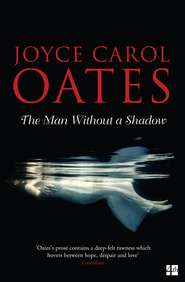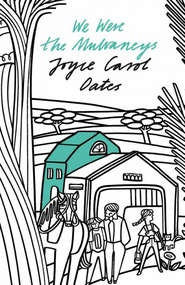По всем вопросам обращайтесь на: info@litportal.ru
(©) 2003-2025.
✖
Mudwoman
Автор
Год написания книги
2018
Настройки чтения
Размер шрифта
Высота строк
Поля
Unmistakably, there was a thrill to this. Daring and reckless the older boys crept out onto the ice, toward the unfrozen center. Younger children stayed behind out of timidity.
You must not let them entice you, Meredith! If you are injured they will run away and abandon you for that is their kind—they are cruel, can’t help themselves for their God is a God of conquest and wrath and not a God of love.
There was a dislike, a resentment of Meredith’s parents—not to their faces but behind their backs—for Konrad’s unmanly pacifism. For Beechum County was a gun culture. Hunters, warriors.
M.R. felt a mild headache coming on. She hadn’t eaten since early that morning and then at her desk at home, answering e-mails.
Solitary mealtimes are not very pleasurable. Solitary mealtimes are best avoided.
The deficiency of philosophy is that it has no stomach, no guts. In all of classic philosophy not a single pulsebeat of feeling.
Oh why hadn’t she invited Agatha and Konrad to Ithaca for this evening! It would have been so easy to have done, and would have meant so much to them.
M.R. loved her parents but often seemed to forget them. Like clouds sailing overhead, they were—snowy-white clouds of surpassing and unearthly beauty at which no one thinks to look.
“I will do better. I will try harder. I hope they will forget me.”
She meant forgive of course. Not forget.
In fact she was—just now—crossing the Black Snake River. The wrought-iron truss bridge vibrated beneath the lightweight Toyota. The river was thirty or more feet below the bridge, rushing like something demented. Wheels—spirals—of light—like defects in the eye. You could imagine a giant serpent in that molten liquid—lifting its head, tawny eyes and fanged jaws.
Look again, the serpent has vanished beneath the water’s surface.
Farther to the west, at Carthage, in layers of crusted shale there were fossils M.R. had searched for, as a girl. Ancient crustaceans, long-extinct fish. Her biology teacher had sent her out: he’d identified the fossils for her. M.R. had drawn them in her notebook, with particular care.
A string of A-pluses attached to Meredith Neukirchen like a comet’s long tail.
Here the river’s shore was less rocky, more marshy. The river did not appear to be the river of her girlhood and yet—it was strangely familiar to her, like the serpent’s head.
Off the bridge ramp was a sign for RAPIDS—5 MILES. SLABTOWN—11 MILES. RIVIERE-DU-LOUP—18 MILES. In the near distance Mount Moriah—one of the highest peaks in the southern Adirondacks—and beyond, shadowy peaks whose names M.R. couldn’t recall with certainty: Mount Provenance, Mount Hammer? Mount Marcy? It was geology—nineteenth-century geology—that had first shaken the Christian creation-myth so deeply entrenched in Europe, and in the blood-steeped soil of Europe, you would never think it might be extirpated like rotted roots; eruptions of human certainty like eruptions of volcanic lava scouring everything in its path. For what was the earth but a mass of roiling lava—not a “created” thing at all.
Within a few decades, the old faith was shaken utterly. All was devastation.
Except, as Nietzsche so shrewdly observed, the devastation was ignored. Denied. Knowledge of Earth’s position in the universe had entered the blind-visual field of neglect.
She would not be a party to such denial, such blindness. She, empowered as the first woman president of a great university, would speak the truth as she saw it.
For in her vanity she wished to align herself with the great truth-tellers—not with those who spoke to placate.
In high school M.R. had been drawn to geology as to other sciences but in subsequent years her passion for the abstract—for philosophy—“ethics”—had driven out the hard concrete names like irreducible ores—igneous, sedimentary, metamorphic.
Science is another name for God-seeking, the Neukirchens had assured her. Their Quaker faith was so very wide, vast, all-encompassing—a Sargasso Sea without boundaries and without a Savior.
M.R. dared not glance at the dashboard clock. It was time for her to turn back, she knew.
She was passing trailer villages, small asphalt-sided houses, semi-abandoned farmhouses and barns. She was passing the Old Dutch Road—was this familiar?—and the Sandusky Road. The narrow Black River Road curved dangerously close to the river. On that side, the shoulder had been eaten away by erosion. On the farther shore was a curious steep step-ladder-like hill or small mountain near-bare of vegetation from which gigantic boulders seem to have loosed and fallen into the river. There was the look of an ancient landscape shaken, broken. Yet a powerful beauty in these broken shapes.
A sharp pain struck between her shoulder blades like a stinging insect for she’d been tensing up, driving. Leaning forward gripping the steering wheel in both hands as if fearing the wheel might get away from her.
He’d said to her—her (secret) lover—Eternity hasn’t a damn thing to do with time—but he’d been joking, he had not meant to be cruel or mocking and she had kissed his mouth, daring to kiss his mouth that was only just barely hers to kiss.
More mysteriously he’d said Earth-time is a way of preventing everything happening at once.
Did he mean—what? M.R. wasn’t sure.
Telling a story, you must lay out “events”—in a chronological sequence. Or rather, you must establish a chronological sequence, so that you know what your story is, and can “tell” it.
Only in time, calendar-time and clock-time, is there chronology. Otherwise—an entire life is but a nanosecond, as swiftly ended as it began, and everything has happened at once.
Possibly, this was what Andre meant. His field was galaxy evolution and star formation in galaxies—his boyhood obsession had been a hope of “mapping” the Universe.
M.R. had had few lovers—very few. For men were not naturally—she supposed, sexually—attracted to her. Her weakness was for men of exceptional intellect—at least, intelligence greater than her own. So that she would not be required to mask her own.
The sorrow was, such men seemed to have been, through her life, invariably older than she. And some of them cynical. And some worn like old gloves, scuffed boots. Most were married and some twice-or even thrice-married.
She did want to be married! One day.
She did want to marry Andre Litovik.
He’d tried to discourage her from accepting the presidency of the University. She’d had a sense that he was fearing his girl-Amazon might drift from him after all.
If truly he loved her—he’d have been hopeful for her, proud of her.
Or maybe: even an exceptional man has difficulty feeling pride in an exceptional woman.
M.R. tried to determine where she was. Ever more uneasily she was conscious of time passing.
Ready you must be readied. It is time.
A sign for SPRAGG 7 MILES. SLABTOWN 13 MILES. A sign for Star Lake, in the opposite direction—66 MILES.
Spragg—Slabtown—Star Lake. M.R. had heard of Star Lake, she thought—but not the others, so oddly named.
Abruptly then she came to a barrier in the road.
DETOUR
ROAD OUT NEXT 3 MILES
You could see how beyond the barrier a stretch of road had collapsed into the Black Snake River. Quickly M.R. braked the Toyota to a stop—the earth-slide was shocking to see, like a physical deformity.
“Oh! Damn.”
She was disappointed—this would slow her down.
She was thinking how swiftly it must have happened: the road caving in beneath a moving vehicle, a car, a truck—a school bus?—plunging into the river, trapped and terrified and no one to witness the horror. Not likely that the road had simply collapsed beneath its own weight.
Death by (sheer) accident. Surely this was the most merciful of deaths!











